
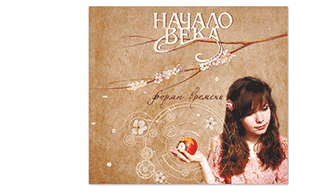 © 2005 – 2014, Начало Века
|
|
Пресса
|
|
11.10.2010 Статья о новом альбоме группы «Начало Века» – «Формы времени» на сайте «Far From Moscow». Nachalo Veka: Saving a Folk Tradition from Angry Ethnographers (Спасая фольклорное наследие от злых этнологов). Автор: David MacFadyen.
Nachalo Veka: Saving a Folk Tradition from Angry Ethnographers.
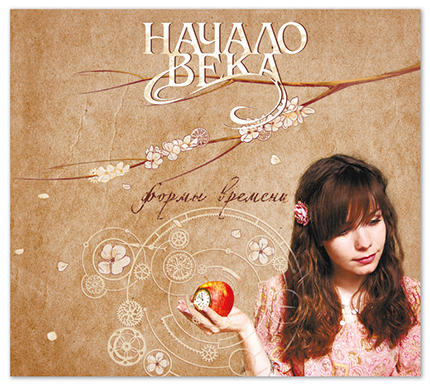 Nachalo Veka are from the city of Volgograd, better known as Stalingrad for much of the twentieth century. A location associated with epic warfare and/or heavy industry would not seem the most logical home for a folk-rock ensemble, and yet if we leaf through some earlier pages of that region's history, the centuries are rich with tales of Cossack revolt and ancient river trade. It is this more distant epoch that inspires the group's work, including their brand new album, released today and available for downloading from Kroogi.
As we'll see, however, the key challenge on this recording will be how to make that dusty heritage relevant.
The band members are currently Alena Sergievskaia (vocals), Mikhail Sanok (guitar), Elena Guseva (keyboards), Aleksei Itiuzhov (texts), Roman Sheletov (bass), and Vladimir Busel' (drums). They frame the new CD, entitled "Forms of Time" with a couple of quotes. The first comes from poet Joseph Brodsky, the latter from Spanish writer Maria Zambrano. They read - once translated - as follows: "Time is greater than space. Space is a thing. Time, in essence, is a thought of space. Life is a form of time"; "All that is born - or yet to be - is promised to us in forms."
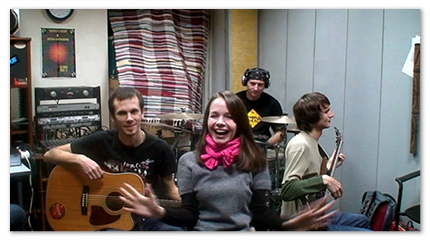
Taken together, these two quotes suggest that the CD's lyrics will examine some issues beyond ostensible existence.
And indeed: Volgograd seems - at least visually - to express its full and lasting significance with the angular, often sad forms of Soviet architecture. It is associated with the tribulations and tragedies of the century that built it; it looks the way it lives. Its evident forms are, therefore, supposed to be adequate evidence of the region's history. The quotes from Brodsky and Zambrano, however, suggest that tangible shapes are mere "clots" in time's flow, as the poet once said elsewhere.
There are, in short, greater and grander issues hidden from view. Tangible forms, those of material existence, either give a false impression of history's plenitude or are merely one (fleeting) stage of all that has yet to be.
And indeed, in a recent interview, Elena Guseva remarked: "Our entire life is the transition from one form to another. Music itself is a form of time. Our new album is something similar, where the past, present, and future are all interwoven." Linear patterns give way to interlocking lines of significance, none of which can be fully comprehended from a visual examination of the here and now. «Music itself is a form of time...» The CD is given over to a closer look at time's operation.

This dual concept of non-linear chronology and music as an expression thereof is used to grant the album's ten songs an overarching significance. Through the examination of one individual's maturation, we are slowly invited to step back from our received, simplistic notions of unidirectional time. The past, in other words, lingers in the present - and the future wields its influence before we reach it. Already we can see how a defence is being built against dismissive views of "old-fashioned" or "antique" folk material.
Sergievskaia says: "The CD tells the story of of one person's life - the various ages and stages of his existence. The hero of our songs and his self-awareness both change from song to song. Each track is established on a certain [musical or thematic] plane, only for the next composition to take us in a totally different direction."
This theme of wandering or peripatetic experience goes beyond the rather weighty issues raised thus far; it is used do deal with simpler matters of stylistic fidelity, too.
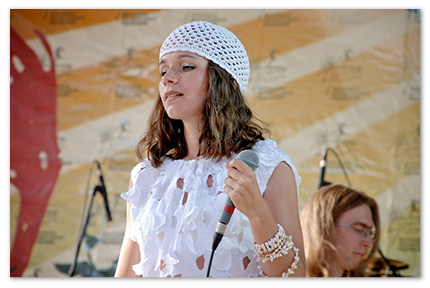
Nachalo Veka are one of Russia's better known "folk rock" ensembles. This is a risky choice of style, one might argue, in that the Slavic folk scene is heavily populated by the residents of two opposing camps. On one side, we have the champions of ethnographic "purity," who harbor much dislike for the other fifty percent of music lovers - those who are perfectly content with "bastardized" folk songs set to a pre-recorded backbeat and broadcast to families at 6pm on television.
The former group declares itself the champion of culture; the latter is happy with cabaret. Both camps may include songs of milkmaids, samovars, and epic drinking.
Finding a middle ground between "serious" and "silly" is very difficult - and extremely likely to incur the wrath of both teams. The members of Nachalo Veka, though, are prepared for a fight: "You could criticize our new music for excessive pop influences and excessive ties to rock at the same time."
Aleksei Itiuzhov, the group's lyricist, chips in with some more specific commentary: "We don't try to stay within the limits of any one style or format. We simply do what we want to; we've always been in favor of freedom! We'd like to represent a certain liberty in both thought and music: we'd like our listeners to sense that. It's the main message in everything we do."
The shackles of actuality can be cast off with a smile, a couple of Buddhist gestures, and a perfumed candle. (The same candle, though, looks set to ignite a calendar and spoil the general calm.)
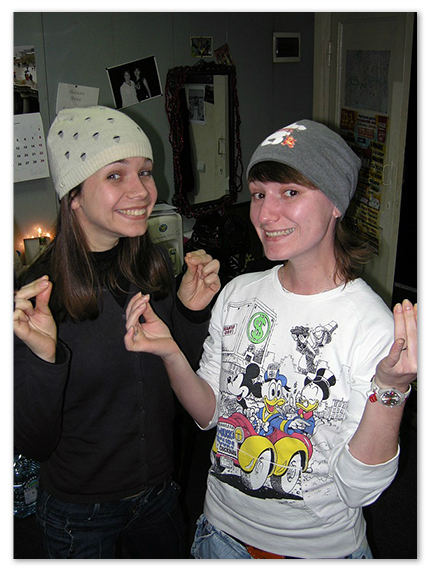
Whatever the artists' cheery stance towards potential criticism, the public themselves may not be so forgiving.
Itiuzhov adds, in anticipation of a public shaming: "When we act with that kind of abandon, we sometimes feel like a nudist on a public beach! As a result, our new album probably won't get included in the pantheon of what's normally referred to as 'Russian folk music.' The CD is closer to some kind of culinary experiment." «When we act with that kind of abandon, we sometimes feel like a nudist on a public beach!» Realizing that the po-faced puritans will never be pleased, the band uses an African kalimba - and seemingly steel drums, too - within the first few minutes of the opening track. They do so despite the song's quintessentially Russian imagery of a "Tiny [Rustic] Path" as a metaphor for life's passage.
Much training was required in order to handle these snowballing traditions - while the candle looked increasingly problematic.
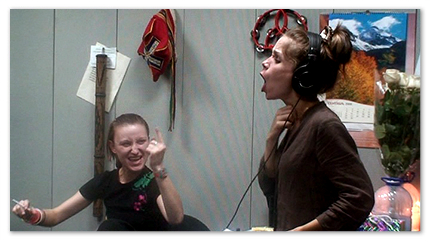
The first few phrases of "Tropinka" (included here) warn us that "it's always hard to find your path [in life]... evil twigs will snag your legs - and carve their odd designs upon your skin." «...evil twigs will snag your legs - and carve their odd designs upon your skin.»Over and above these cuts and scratches of physical toil lies the prime virtue celebrated on "Formy Vremeni" of patience - or, perhaps, severe stoicism.
The second track on the album, "Wheel" (Koleso) declares as much, while the now-familiar summertime single "All Will Pass" implores us to wait for better times... perhaps. "There's nobody to trust; she cannot sleep at night. The wind will change again; the pain won't stop" - and yet the chorus is sure that "all will pass! Everything will happen again. Each and every year..."
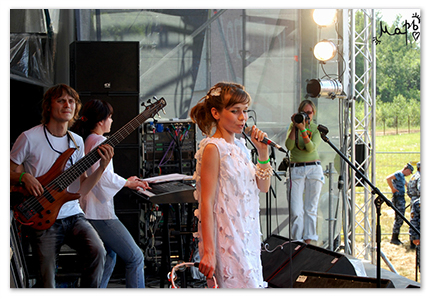
The notion of universal transience (that "all will pass") is consoling; the idea of universal return is not! Tragedy will melt away - only to reappear. Patience and stoicism therefore walk hand in hand; they temper any bold discussion of unfettered "freedoms." The inclusion by Nachalo Veka of non-traditional instrumentation may speak to creative liberty, but their general outlook - informed by themes of cyclicality - does the opposite. The band is thus able to balance songs of limitation and liberty: songs, in other words, of "form" and "time."
Having reached these bold oppositions and relatively simple conclusions, it's no surprise that the musicians are able to make some antique motifs very modern. They sing, by way of example, of how age and anxiety start to "carve their odd designs" on our face; both ancient lyrics and modern laments declare how bad relationships can take a visible toll on our appearance: "How can the girl not be sad? How can she not curse fate? How might she abandon these rags and say goodbye to the mirror? Nothing happens as it should, whatever she tries... Somebody, it seems, is quietly laughing behind her back."
Consolation from timeless woes is found in friendship - and the same old songs.

The appeal and success of "Formy Vremeni" lies in this delicate balance between folk tradition and fashion. The band, by their own admission, do not aim for a trend-setting aesthetic, but the very fact that they're able to wrestle a folk heritage away from warring factions and - with level-headed competence - create touching songs of modern relevance is cause enough for celebration.
After all, the charm and emotional clout of pre-modern vocal traditions is still considerable in Slavic culture. They inspire the academic brilliance of Pelegeia, for example, or the frightening electronic canvases of Volga and 4 Pozicii Bruno. In between those ethnographers, electronic wizards and the dancing bears of primetime, there are huge swathes of virgin territory.
Thankfully bands like Nachlo Veka are willing to take a walk across the same land - and face the friendly fire - as they nurture themes of freedom and fruition... against the ravages of time.
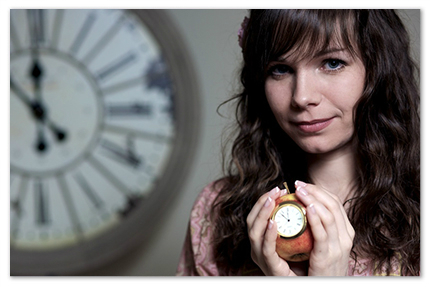
Автор статьи: David MacFadyen.
Ссылка на источник >>> |
| | Назад | |
|